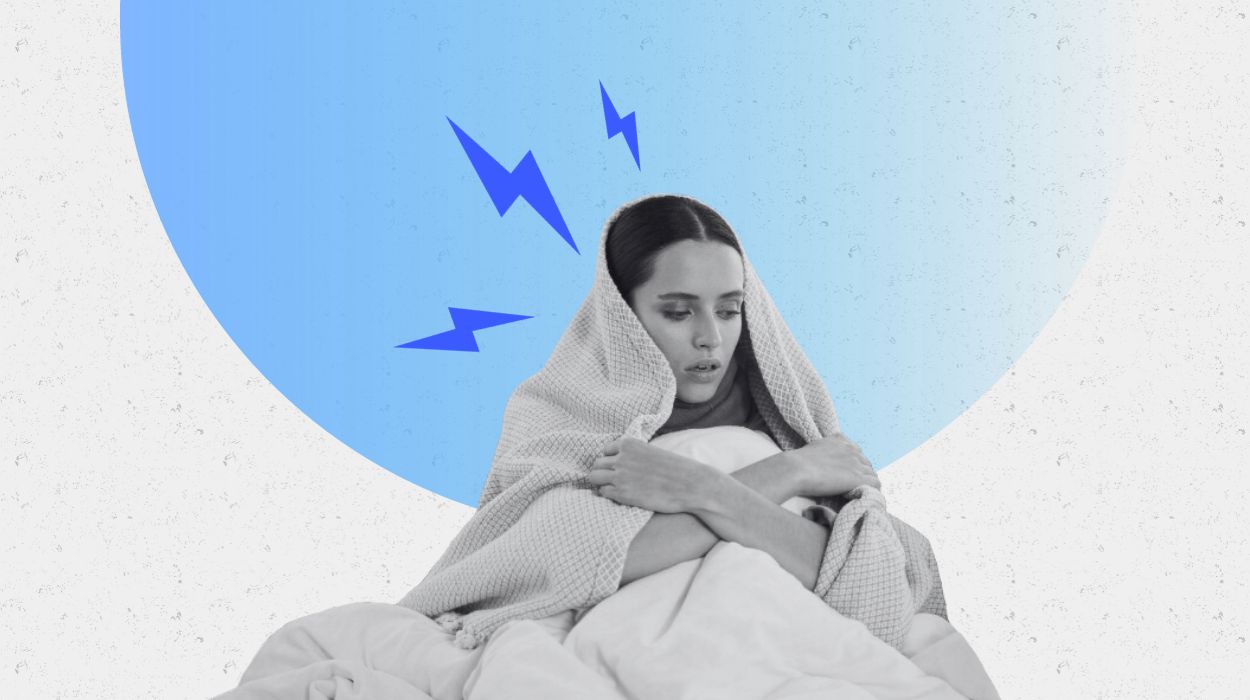 Expert's opinion
Expert's opinion
Expert's opinion
The article is a subjective view on this topic written by writers specializing in medical writing.
It may reflect on a personal journey surrounding struggles with an illness or medical condition, involve product comparisons, diet considerations, or other health-related opinions.
Although the view is entirely that of the writer, it is based on academic experiences and scientific research they have conducted; it is fact-checked by a team of degreed medical experts, and validated by sources attached to the article.
The numbers in parenthesis (1,2,3) will take you to clickable links to related scientific papers.
How To Stop Anxiety Chills: Useful Advice You Should Know In 2024

Anxiety is a complex condition with numerous physical symptoms varying in severity and type. In threatening situations, the autonomic nervous system can produce physical anxiety symptoms. For example, chills can indicate the onset of a severe anxiety attack. Chills can be perceived as a warning sign for an impending anxiety attack or as a separate illness. Regardless, everyone wishes to be free of anxiety and chills, so the pressing question is how to stop anxiety chills.
Chills can also occur with other physical symptoms, such as an irregular heartbeat, a faster heart rate, and increased muscle tension. If you want to treat anxiety shivers, many anxiety treatments are available, ranging from therapy to lifestyle changes to medication.
But, before we get to the solution, here are some facts about anxiety and chills.
How To Manage Anxiety Chills
Anxiety chills can be relieved by:
- Wearing warm clothes.
- Moving around and being active.
- Deep breathing.
- Practicing progressive muscle relaxation.
- Combining lifestyle changes, therapy, and medication.
How To Stop Anxiety Chills Safely
Chills from anxiety are generally harmless, but they can be highly uncomfortable. Some can also last longer than usual, while others happen only occasionally.
The best treatment for anxiety and chills addresses the underlying cause rather than the anxiety symptoms. Medication can be administered if a panic attack is identified as the cause.
Here’s how to stop shaking from anxiety, whether you want immediate relief or long-term treatment:[1]
Wear Warm Clothes
Wrapping up in warm clothing can help to lessen the severity of chills, making them more bearable.
How to stop anxiety chills? A drop in internal body temperature causes anxiety and chills. However, chills can occur even in hot environments. As a result, wearing warm clothing such as coats and blankets when experiencing chills can help reduce discomfort for some people.
Move Around

Light physical activities like walking or jogging can also help. Movement increases blood flow to deprived areas during chills, restoring some warmth.
However, it cannot stop the chills, underlying causes, or the onset of anxiety disorders such as panic attacks.
Control Your Breathing
Anxiety chills cause your breathing rate to increase, exacerbating the chills. As a result, it is critical to slow down your breathing during times of stress. Practicing deep breathing can often ease an anxiety attack.
Practice Progressive Muscle Relaxation

This technique allows your mind to relax and relieve stress by focusing on specific muscle groups[2] and gradually tensing and relaxing them. The procedure allows tension to flow away from the muscles, eliminating chills.
Seek Professional Help

If this active stress response worsens and none of the above methods work, it may be time to consult a medical professional.
If this is your first time experiencing a stress reaction such as chills, you should seek professional help to rule out any serious health issues that may be lurking. If you have anxiety, your doctor may refer you to a psychologist or psychiatrist to be screened for neurological disorders or chronic stress symptoms.
Given that both physical and mental health conditions can cause anxiety chills, it is crucial to pursue a thorough course of treatment that includes counseling, dietary adjustments, and medication, as needed.
Lifestyle Changes
Although lifestyle modifications may not be as effective as medication and therapy, they contribute to developing habits that can help prevent anxiety attacks.
You might need to:
- Do more exercise.
- Improve your diet.
- Control your stress levels.
- Avoid caffeine and other stimulants.
- Avoid consuming alcohol and other intoxicants.
- Exercise mindfulness.
Therapy
Therapy can assist in identifying and mitigating the causes of anxiety. Your doctor may also recommend talk therapy, such as cognitive behavioral therapy,[3] which identifies and treats the intrusive thoughts and behaviors that are causing your anxiety.
By confronting anxiety triggers, exposure therapy[4] helps you become less sensitive to them. These could be everyday activities that you avoid out of fear.
You can also enroll in online therapy, which is more affordable and practical because it can be accessed from the comfort of your home or while on the go.
Medication
To control the condition, antidepressants,[5] such as selective serotonin reuptake inhibitors and serotonin-norepinephrine reuptake inhibitors, may be used. Your doctor may also prescribe anxiety-specific medications for use during anxiety attacks.
Symptoms Of Anxiety Chills
Everyone gets chills when it’s cold outside, but what do anxiety chills feel like?
Chills from anxiety are similar to cold weather chills but can also cause hot flashes and sweating. They are often accompanied by other physical, emotional, and behavioral symptoms[6] and can result from severe anxiety conditions such as panic attacks or a fight or flight response.
Anxiety chills can be identified by symptoms such as
A Drop In Body Temperature
The body lowers internal temperatures as part of the fight or flight response by altering the hypothalamus and inducing goosebumps. Lower core temperatures allow the body to focus first on the execution stage, where it fights or flees.
For a brief period, you might experience chills before adjusting to your low body temperature during anxiety.
Hot Flashes And Sweating
Sweating is another anxiety response that alerts the body and speeds up the cooling process. Frequently, people only notice sweating once they get chills. Sweating can be caused by psychogenic fever,[7] which is overheating caused by an anxiety disorder. Because heat makes defending and fleeing difficult, the body sweats to cool off and conserve energy.
Change In Blood Flow
Anxiety also directs blood flow to the most critical areas of the body. Blood may flow less to the fingers and toes, keeping them cooler and more freely to the heart, where it is most needed. However, all areas of the body receive enough blood to function normally.
Faster Breathing
As an anxiety response, your breathing rate increases, resulting in hyperventilation. Breathing becomes more rapid to increase oxygen intake and help lower body temperature. Excessive breathing can cause mild to severe chills until your body adjusts. That is why practicing breath control can ease anxiety symptoms.
Trembling
The primary symptom of chills from anxiety is trembling. Parts of the body that have been chilled, such as the fingers, may tremble. Shaking from anxiety may be uncontrollable due to muscle contraction and relaxation, which regulate core temperature.
Numbness and tingling sensations in the hands are also possible. The increase and decrease in heat loss during anxiety cause mixed symptoms such as chills, sweating, and shivering. Anxiety and chills are unpredictable and uncontrollable.
Other Physical Symptoms Of Anxiety
Anxiety can begin as a psychological problem and then progress to affect your physical health or vice versa. As a result, it is common for anxiety disorders to be accompanied by several physical symptoms, including
- Faster heartbeats.
- Dizziness.
- Stomachaches.
- Diarrhea.
- Nausea.
- Chest pain.
- Tingling sensations.
Anxiety can be characterized by two or more physical symptoms co-occurring.
Physical symptoms such as irritability, restlessness, and racing thoughts can coexist with psychological and behavioral symptoms. It is also important to note that anxiety disorders or other underlying health conditions can cause physical symptoms of anxiety.
Causes Of Anxiety Chills
Anxiety and chills are common after an unexpected event, but can anxiety cause chills?
Yes. Many mental and physical factors that cause chills are altered by stress.
Chills can occur for various reasons, including stimulating the hypothalamus[8] in the brain during anxiety, which regulates body heat. The fight-or-flight response may also make you feel colder or sweatier.
Chills are commonly associated with generalized anxiety disorder and panic attacks but can also be symptoms of PTSD or social anxiety.
Acute stress or panic causes an increase in the release of stress hormones, such as adrenaline and cortisol hormones, which causes physical sensations such as dilated pupils, stomach aches, a fast heart rate, nausea, and shortness of breath.
These stress hormones both directly and indirectly contribute to chills by promoting symptoms such as increased heart rate and breathing.
The Takeaway
The duration of anxiety chills is determined by whether they are caused by acute anxiety, such as an accident, or chronic anxiety, such as repetitive, intrusive thoughts or panic disorder.
Chills, despite their discomfort, are typically harmless. However, they should be taken seriously because the underlying health condition can be highly disruptive.
Chills can be uncontrollable due to symptoms such as muscle tension and trembling. Despite the complexities of the symptoms and causes, chills from anxiety are similar to cold chills and can be alleviated by staying warm.
Talk therapy and medication are frequently used as the first defense against anxiety and chills because they address the underlying issues.
+ 8 sources
Health Canal avoids using tertiary references. We have strict sourcing guidelines and rely on peer-reviewed studies, academic researches from medical associations and institutions. To ensure the accuracy of articles in Health Canal, you can read more about the editorial process here
- Dialogues in Clinical Neuroscience. (2017). Treatment of anxiety disorders. [online] Available at: https://www.tandfonline.com/doi/full/10.31887/DCNS.2017.19.2/bbandelow.
- Toussaint, L., Quang Vinh Nguyen, Roettger, C., Dixon, K., Offenbächer, M., Kohls, N., Hirsch, J.K. and Sirois, F.M. (2021). Effectiveness of Progressive Muscle Relaxation, Deep Breathing, and Guided Imagery in Promoting Psychological and Physiological States of Relaxation. [online] 2021, pp.1–8. doi:https://doi.org/10.1155/2021/5924040.
- A.M, E., Suzanne, Hagenaars, M.A., Batelaan, N.M., Bockting, C.L.H., van, Pim Cuijpers and Engelhard, I.M. (2020). Long-term Outcomes of Cognitive Behavioral Therapy for Anxiety-Related Disorders. [online] 77(3), pp.265–265. doi:https://doi.org/10.1001/jamapsychiatry.2019.3986.
- Annual Reviews. (2016). The Efficacy of Exposure Therapy for Anxiety-Related Disorders and Its Underlying Mechanisms: The Case of OCD and PTSD. [online] Available at: https://www.annualreviews.org/doi/full/10.1146/annurev-clinpsy-021815-093533.
- Expert Opinion on Pharmacotherapy. (2018). Pharmacotherapy for generalized anxiety disorder in adult and pediatric patients: an evidence-based treatment review. [online] Available at: https://www.tandfonline.com/doi/full/10.1080/14656566.2018.1491966.
- Dialogues in Clinical Neuroscience. (2015). Epidemiology of anxiety disorders in the 21st century. [online] Available at: https://www.tandfonline.com/doi/full/10.31887/DCNS.2015.17.3/bbandelow?scroll=top&need.
- Temperature. (2015). Psychogenic fever: how psychological stress affects body temperature in the clinical population. [online] Available at: https://www.tandfonline.com/doi/full/10.1080/23328940.2015.1056907.
- Hinds, J.A. and Sanchez, E.R. (2022). The Role of the Hypothalamus–Pituitary–Adrenal (HPA) Axis in Test-Induced Anxiety: Assessments, Physiological Responses, and Molecular Details. [online] 2(1), pp.146–155. doi:https://doi.org/10.3390/stresses2010011



